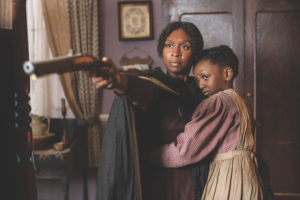This year, there are more than a few shoo-ins to win Academy Awards. The show itself, which is still the most glamorous spectacle of the year on good old broadcast TV, unfolds at 8 p.m. on Sunday, Feb. 9.
The Best Actor winner is expected to be Joaquin Phoenix for Joker, and the Best Actress winner, Renée Zellweger for Judy. The Best Picture winner is shaping up to be 1917, and Best Director will likely go to Sam Mendes for the same film. The Best Supporting Actor winner is expected to be Brad Pitt for Once Upon a Time… in Hollywood, and the Best Supporting Actress winner, Laura Dern in Marriage Story.
For Best International Feature Film, the former foreign-language category, the winner is expected to be Parasite. There are always upsets, of course, because the Academy is a fickle bunch, and getting worse as it grows and diversifies. There are still too few people of color nominated, and too few women in non-acting categories. When the queer, black art-house triumph Moonlight won the 2016 Best Picture Oscar, that was progress, but then Green Book won last year, and it seemed as if we were back to square one.
Is there any rhyme or reason to all of this? Well, yes, but it’s only tangentially related to art. 1917 is a logical Oscar winner. It’s an intensely suspenseful World War I film, and a bit of a formal exercise, all meant to look as if it’s one long take. By Hollywood standards, that smacks of art. Director Mendes won before, for American Beauty, and winning an Oscar is a kind of Hollywood pedigree. The film is a limited achievement, but there’s really no other nominee with the same momentum. I think Parasite is a far better film, and Once Upon a Time… in Hollywood is Tarantino in top form. But voting for Oscar is a brand decision by the Academy of Motion Picture Arts and Sciences: does this film best represent the industry? In the past, choices were respectable, redemptive, and reeked of middlebrow quality. Now, who knows?
When it comes to actors, Oscar prefers eye-popping transformations to subtle characterizations. Thus Joaquin Phoenix, emaciated and delusional, will win in Joker. Brad Pitt will win because his part is anything but supporting — he’s arguably the sole lead of Once Upon a Time… in Hollywood, though Leonardo DiCaprio is nominated for Best Actor. Laura Dern will win because she’s playing against type. And Renée Zellweger? That brings us to Judy, now streaming and available on DVD.

As a film, Judy is neither all bad nor all good. Its biggest flaw is that it doesn’t convey the magic of Judy Garland: why, as a performing artist, her emotional pull and outsize talent were so powerful — what it was that made her a star. The movie focuses instead on the endgame of a terminal career, and it demonstrates Garland’s formidable instincts as a survivor as she does concerts in London in 1968 and marries Mickey Deans. It doesn’t quite capture the addictions and self-destructive impulses that killed her at age 47, and it only hints at the insecurities and immaturities that drew her so strongly to gay men (her dad, a couple of husbands, and her most passionate fans). Zellweger skillfully distills Garland’s bitterness over an industry that mercilessly exploited her. It’s a tough, adult performance, and worthy, but Zellweger is hardly the standout female actor of the year. Any of her four co-nominees are equally deserving, arguably more so. But, hey, that’s show biz.

One co-nominee, Cynthia Erivo in Harriet, which is now streaming and available on DVD, might herself have been the shoo-in in a perfect world. Erivo is a Broadway phenom (a Tony winner for the much-lauded revival of The Color Purple) who delivers a solid and moving performance as Harriet Tubman, runaway from slavery and pivotal figure of the Underground Railroad in the years leading up to the Civil War. Harriet is a surprisingly rewarding cinema experience. At its heart, it’s by-the-book Hollywood, idealizing an iconic hero in a horrific historical era (a bit like Schindler’s List) and romanticizing her clairvoyance and relationship to God. But the acting is uniformly top-notch, and the director, Kasi Lemmons (whose claim to fame, Eve’s Bayou, is amateurish and overrated), keeps the typical simplism of holy subject matter in check. What’s more, Lemmons crafts a rich and involving cinematic tapestry: a beautiful score by Terence Blanchard, expressive cinematography by John Toll, and escape scenes that are as suspenseful and well directed as they come. Lemmons, it turns out, is a talent to watch.

Jojo Rabbit, a Best Picture and multiple-category nominee that just became available for streaming and on DVD, will most likely go home empty-handed for the very reasons that make it most interesting. It’s a satirical romp about a 10-year-old boy in Nazi Germany who idolizes Hitler and discovers that his mom (Scarlett Johansson, nominated for Best Supporting Actress) is hiding a Jewish girl in a secret closet. The actors are British and American and speak English with movie-German accents. The director, Taika Waititi, is a New Zealander of Jewish, Maori, and British descent who plays Hitler as Jojo’s imaginary friend. The movie deftly alternates between farce and ironic melodrama, and it’s actually as funny as it is disturbing. Some have bristled at the way it humanizes anti-Semitism and Hitler-worship, but that’s simply wrong. At a time when 40 percent of the U.S. blindly supports a despot wannabe like Trump, the lessons of Jojo Rabbitare dead-on. The movie has some dumb ideas, like making Sam Rockwell a gay-ish Nazi, but originality is often not PC. Overall, it’s harmless and diverting.



